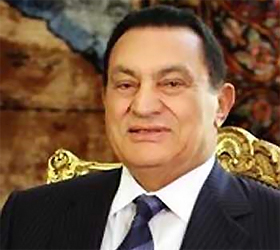 As Egypt prepares for parliamentary elections slated for Nov. 29, the debate over Egyptian President Hosni Mubarak’s succession plan is heating up. A STRATFOR source recently claimed that Mubarak might have decided to run for another term before implementing his succession plan, though whether his health would allow him to do so has been the subject of much speculation since his gallbladder surgery in Germany in
As Egypt prepares for parliamentary elections slated for Nov. 29, the debate over Egyptian President Hosni Mubarak’s succession plan is heating up. A STRATFOR source recently claimed that Mubarak might have decided to run for another term before implementing his succession plan, though whether his health would allow him to do so has been the subject of much speculation since his gallbladder surgery in Germany in
March.
Though the presidential election will not be held until the summer of 2011, public appearances by potential presidential candidates, such as Mubarak’s son, Gamal, have overwhelmingly dominated the parliamentary election campaign. Meanwhile, the opposition remains divided over a call by presidential candidate Mohamed elBaradei to boycott the parliamentary elections altogether, a move that would allow the
ruling party to further strengthen its grip on parliament.
Confident that the ruling National Democratic Party (NDP) will be able to undermine its main opponents and dominate the parliamentary elections, the Egyptian government seems instead to be largely focused on preparing for the presidential succession.
The main controversy surrounds Gamal Mubarak, who has recently come into the public spotlight, fueling speculation among Egyptians that he will be designated his father’s successor. Gamal’s younger supporters have organized a widespread campaign and put up his posters in several Egyptian cities to increase his popularity.
Gamal also made a high-profile visit to Washington with his father to take part in Israeli-Palestinian talks, which many saw as a move to portray him as a statesman fit for the presidency. The president’s son has made many remarks about the positive role the private sector plays in Egypt’s economy and has emphasized the significance of the fight against corruption and poverty in an attempt to raise his profile at home.
STRATFOR, however, has long received indications that the Egyptian president’s real intention is to entrust Egyptian intelligence chief Omar Suleiman with the presidential post for at least one year before his son — sufficiently experienced by then — takes the position. By doing so, Hosni Mubarak aims to gain the Egyptian army’s confidence and support before his son becomes president.
However, the president might have made a slight change to this plan by deciding to run for another term to help smooth out the succession. According to a STRATFOR source, Hosni Mubarak is likely to appoint Suleiman as vice president — a move traditionally made in Egyptian politics before handing over the presidency — if his health deteriorates rapidly during his next term. Suleiman would be Egypt’s first vice-president since Hosni Mubarak became president. He would then assume the presidency for a term at most before handing it over to Gamal in accordance with the previously agreed-upon plan.
This strategy is likely meant to help Hosni Mubarak break the resistance of hardliners within his regime — led by NDP Secretary-General Sawfat al-Sharif — and avoid criticism from internal opposition forces and some international actors that the younger Mubarak is inheriting the presidency through anti-democratic means – Stratfor











